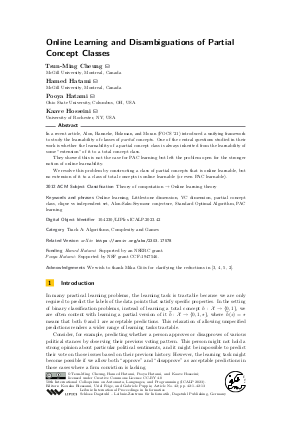Online Learning and Disambiguations of Partial Concept Classes
Authors Tsun-Ming Cheung, Hamed Hatami, Pooya Hatami, Kaave Hosseini
-
Part of:
Volume:
50th International Colloquium on Automata, Languages, and Programming (ICALP 2023)
Part of: Series: Leibniz International Proceedings in Informatics (LIPIcs)
Part of: Conference: International Colloquium on Automata, Languages, and Programming (ICALP) - License:
 Creative Commons Attribution 4.0 International license
Creative Commons Attribution 4.0 International license
- Publication Date: 2023-07-05
File

PDF
LIPIcs.ICALP.2023.42.pdf
- Filesize: 0.63 MB
- 13 pages
Document Identifiers
Related Versions
Subject Classification
ACM Subject Classification
- Theory of computation → Online learning theory
Keywords
- Online learning
- Littlestone dimension
- VC dimension
- partial concept class
- clique vs independent set
- Alon-Saks-Seymour conjecture
- Standard Optimal Algorithm
- PAC learning
Metrics
- Access Statistics
-
Total Accesses (updated on a weekly basis)
0Document
0Metadata
Abstract
In a recent article, Alon, Hanneke, Holzman, and Moran (FOCS '21) introduced a unifying framework to study the learnability of classes of partial concepts. One of the central questions studied in their work is whether the learnability of a partial concept class is always inherited from the learnability of some "extension" of it to a total concept class. They showed this is not the case for PAC learning but left the problem open for the stronger notion of online learnability. We resolve this problem by constructing a class of partial concepts that is online learnable, but no extension of it to a class of total concepts is online learnable (or even PAC learnable).
Cite As Get BibTex
Tsun-Ming Cheung, Hamed Hatami, Pooya Hatami, and Kaave Hosseini. Online Learning and Disambiguations of Partial Concept Classes. In 50th International Colloquium on Automata, Languages, and Programming (ICALP 2023). Leibniz International Proceedings in Informatics (LIPIcs), Volume 261, pp. 42:1-42:13, Schloss Dagstuhl – Leibniz-Zentrum für Informatik (2023)
https://doi.org/10.4230/LIPIcs.ICALP.2023.42
BibTex
@InProceedings{cheung_et_al:LIPIcs.ICALP.2023.42,
author = {Cheung, Tsun-Ming and Hatami, Hamed and Hatami, Pooya and Hosseini, Kaave},
title = {{Online Learning and Disambiguations of Partial Concept Classes}},
booktitle = {50th International Colloquium on Automata, Languages, and Programming (ICALP 2023)},
pages = {42:1--42:13},
series = {Leibniz International Proceedings in Informatics (LIPIcs)},
ISBN = {978-3-95977-278-5},
ISSN = {1868-8969},
year = {2023},
volume = {261},
editor = {Etessami, Kousha and Feige, Uriel and Puppis, Gabriele},
publisher = {Schloss Dagstuhl -- Leibniz-Zentrum f{\"u}r Informatik},
address = {Dagstuhl, Germany},
URL = {https://drops.dagstuhl.de/entities/document/10.4230/LIPIcs.ICALP.2023.42},
URN = {urn:nbn:de:0030-drops-180946},
doi = {10.4230/LIPIcs.ICALP.2023.42},
annote = {Keywords: Online learning, Littlestone dimension, VC dimension, partial concept class, clique vs independent set, Alon-Saks-Seymour conjecture, Standard Optimal Algorithm, PAC learning}
}
Author Details
Funding
- Hatami, Hamed: Supported by an NSERC grant.
- Hatami, Pooya: Supported by NSF grant CCF-1947546.
Acknowledgements
We wish to thank Mika Göös for clarifying the reductions in [Bousquet et al., 2014; Göös, 2015; Göös et al., 2016; Balodis et al., 2022].
References
-
Noga Alon, Steve Hanneke, Ron Holzman, and Shay Moran. A theory of PAC learnability of partial concept classes. In 2021 IEEE 62nd Annual Symposium on Foundations of Computer Science (FOCS), pages 658-671. IEEE, 2022.

- Kaspars Balodis, Shalev Ben-David, Mika Göös, Siddhartha Jain, and Robin Kothari. Unambiguous DNFs and Alon-Saks-Seymour. In 2021 IEEE 62nd Annual Symposium on Foundations of Computer Science - FOCS 2021, pages 116-124. IEEE Computer Soc., Los Alamitos, CA, [2022] (C) 2022. URL: https://doi.org/10.1109/FOCS52979.2021.00020.
- N. Bousquet, A. Lagoutte, and S. Thomassé. Clique versus independent set. European J. Combin., 40:73-92, 2014. URL: https://doi.org/10.1016/j.ejc.2014.02.003.
- Mika Göös. Lower bounds for clique vs. independent set. In 2015 IEEE 56th Annual Symposium on Foundations of Computer Science - FOCS 2015, pages 1066-1076. IEEE Computer Soc., Los Alamitos, CA, 2015. URL: https://doi.org/10.1109/FOCS.2015.69.
-
Mika Göös, Shachar Lovett, Raghu Meka, Thomas Watson, and David Zuckerman. Rectangles are nonnegative juntas. SIAM J. Comput., 45(5):1835-1869, 2016.

-
Hao Huang and Benny Sudakov. A counterexample to the Alon-Saks-Seymour conjecture and related problems. Combinatorica, 32(2):205-219, 2012.

- Nick Littlestone. Learning quickly when irrelevant attributes abound: A new linear-threshold algorithm. Machine Learning, 2(4):285-318, 1988. URL: https://doi.org/10.1023/a:1022869011914.
- Jiří Matoušek, editor. Lectures on Discrete Geometry. Springer New York, 2002. URL: https://doi.org/10.1007/978-1-4613-0039-7.
-
Frank Rosenblatt. The perceptron: a probabilistic model for information storage and organization in the brain. Psychological review, 65 6:386-408, 1958.

-
Norbert Sauer. On the density of families of sets. Journal of Combinatorial Theory, Series A, 13(1):145-147, 1972.

- Mihalis Yannakakis. Expressing combinatorial optimization problems by linear programs. J. Comput. System Sci., 43(3):441-466, 1991. URL: https://doi.org/10.1016/0022-0000(91)90024-Y.
